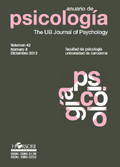Posttraumatic stress disorder: Efficacy of a treatment program using virtual reality for victims of criminal violence in Mexican population
Keywords:
0Posttraumatic stress disorder treatment, virtual reality, criminal violence, cognitive- behavior therapy, prolonged exposureAbstract
The present study shows results of efficacy or virtual reality treatment for Posttraumatic Stress Disorder (PTSD) for criminal violence. The clinical sample was conformed for 20 participants from city of Juarez, Mexico, who voluntarily agreed to join the study, aged between 18 and 65. All participants met the DSM-IV-TR criteria for PTSD and were randomized to two treatment conditions: (a) prolonged virtual reality exposure (n=10) and (b) prolonged imaginal exposure (n=10). Treatment 5was delivered in 12, 90 min individual sessions conducted twice a week. Therapist used a treatment manual (Rothbaum, Difede Rizzo, 2008). Two virtual scenarios for PTSD exposure treatment were used. Improvement was seen in measures of PTSD, anxiety and depression in both treatment groups. However, only reached statistically significant differences between treatment groups on measures of diagnosis and avoidance subscale, obtaining higher therapeutic gains in prolonged virtual reality exposure. The results support the dissemination of empirically validated treatments in Mexican mental health field.Downloads
Issue
Section
Articles
License
The authors who publish in this journal agree to the following terms:
Authors transfer to the publisher all copyright for the full term of protection and for all the world.
The authors can post a copy of their articles in accordance with the policy of free access to the journal.


